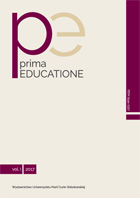„Edukacja ku wolności” – wprowadzenie do waldorfskiej perspektywy
uczenia się i rozwoju
“Education Towards Freedom” – an Introduction to Waldorf Perspectives on Learning and Development
Author(s): Frode BarkvedSubject(s): Social Sciences, Education, Educational Psychology
Published by: Wydawnictwo Naukowe Uniwersytetu Marii Curie-Sklodowskiej
Keywords: Waldorf education; imitation; imagination; independent thinking; development; learning
Summary/Abstract: In the following paper, the author mainly describes what could be called the Waldorf education’s development didactics. This didactical approach is based on Rudolf Steiner’s idea of human development through seven-year periods. In Steiner’s time, this idea, which dates back to the ancient division of human life into heptomade, was, to some extent, still in use. In today’s developmental psychological discourse, the idea of the seven-year periods is virtually absent. One finds the term in the Waldorf pedagogical curricula and literature, but otherwise not. Steiner’s interpretation of the child’s development through the first three seven-year periods had a clear influence on the curricula and the didactics of the Waldorf school. There are given some examples of this below. In the first part, the author focuses on the concepts of imitation, rhythm, and play. In the second part, there are considered the life processes, imagination, and the arts. In the third part, the focus is on cognitive development, the development of complex emotions such as shame and guilt, and the development of autonomy. The author will also take a closer look at the ways in which the ideas on learning and development, emphasized by Steiner over a hundred years ago, could be seen in the light of recent research, especially in neuroscience.
Journal: Prima Educatione
- Issue Year: 6/2022
- Issue No: 1
- Page Range: 183-196
- Page Count: 14
- Language: English

